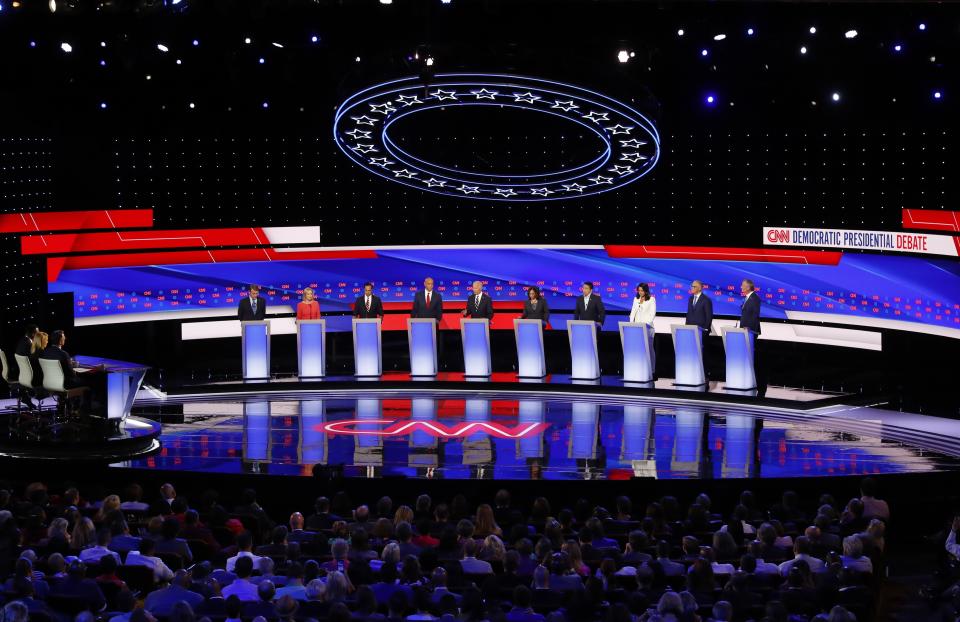DNC likely to raise polling threshold for November debate, sources say
The Democratic National Committee is looking to fine-tune the rules for upcoming debates starting in November, including increasing the threshold needed to qualify for the event, according to sources familiar with the issue.
Already, the DNC rules have thinned the field of candidates who will appear onstage in Houston for the third televised debate Sept. 12 and potentially the next night as well. Only 10 candidates have qualified so far, with possibly two or three more getting in ahead of the Aug. 28 deadline.
The field of eligible candidates may actually grow bigger for the October debate, since the DNC has decided not to raise the polling threshold above 2 percent from its September rules and will also keep the marker for small-dollar donations at 130,000.

But in November the DNC, which is increasingly under fire for its handling of presidential debates, is likely to raise the polling requirement above 2 percent, according to multiple sources involved in the process who spoke to Yahoo News about internal deliberations on the condition they not be identified.
What’s not clear — and seems to be unsettled still — is how high that number will go. Even if it went up only 2 points to 4 percent, it would put major stress on candidates like Beto O’Rourke and Sen. Cory Booker. Neither has received more than 3 percent in any qualifying voter survey yet. Other candidates, like Sen. Amy Klobuchar and former Housing and Urban Development Secretary Julián Castro, have hit 4 percent only once so far.
It’s also unclear whether the DNC will continue to make small-dollar donations a criteria for entry into the debates.
“I think the donor thing may be moot at this point. ... The candidates left standing would have proved their chops on the donor front,” said one former Democratic Party official. “Plus, it has come under the most criticism.”
Indeed, the DNC has been pilloried from various directions for the small-dollar-donor requirement. For the first two debates, in June and July, qualifying candidates had to attract 65,000 unique donors — who usually give between $1 and $20 — with at least 200 donors from 20 different states.
But many candidates have complained that this metric, which was intended to “give the grassroots a bigger voice than ever before,” according to the DNC, has actually just caused their campaigns to waste money.
“Their donor qualification metrics have forced campaigns to spend ungodly amounts of money on Facebook, with minimal benefit,” said one aide to a Democratic candidate, who said their campaign has had to spend an average of $55 on Facebook ads to acquire each new donor, who often donates little more than $1.
“It’s all very problematic towards the goal of beating Donald Trump, because these Facebook investments are superficial and short-term transactional relationships for $1, coming at the expense of candidates investing in field organizers in early states or other things that actually create a long-term benefit to the campaigns and their infrastructure,” the Democratic campaign aide said.
In addition, critics accuse billionaire activist Tom Steyer of gaming the system by buying millions of voter files and renting detailed voter data that were created and housed by outside political groups that he himself has funded, and then using that information to pay for and target ads to likely small-dollar donors. Steyer entered the race only just over a month ago, and yet he has already spent $4.6 million on digital ads via Facebook and Google, more than any other Democratic candidate for president. (President Trump’s reelection campaign, by comparison, has spent $15.5 million this year on digital ads.)
Steyer has also spent over $7 million on TV ads to raise his name identification, key to climbing in the polls, and he now has a ticket to the debate stage in Houston.
The Steyer campaign has yet to respond to inquiries. A DNC spokeswoman did not respond to multiple requests for comment.
Meanwhile, other Democrats have blamed the small-dollar donations for pulling 2020 Democrats to take positions too far left of the mainstream.
Democrats “have gone off the deep end on the far left,” said Paul Begala, a veteran Democratic consultant who made his name as an adviser to Bill Clinton.
During a guest appearance on the “Hacks on Tap” podcast, Begala said he supported the small-dollar-donor requirement when it was announced and still does. But, he said, small-dollar donors “tend to be some of the most ideological people in my party, some of the most committed people, and they’re great. But to get a dollar or $5 from a small-dollar donor you have to send them an email or go viral on a video with something pretty darned extreme.”
Begala advocates for a way to counteract the effect of small donors “pulling so far to the left”: adding a requirement that candidates register voters. “Democrats should say, ‘If you register 25,000 voters between now and September, you’re in the debate,’” he said.
“It’s good for democracy, it’s good for the Democratic Party, and it doesn’t pull you to the left or the right or the center,” Begala said. “You register voters by appealing to their civic responsibility and their patriotism, not because you have the best 14-point plan on the snail darter.”
His proposal didn’t seem to have much traction based on multiple queries to people at the DNC and in campaigns.
“That would have been a worthy thing if adopted earlier,” said the former Democratic Party official. “I think it’s too late to put that in the mix now.”
Download the Yahoo News app to customize your experience.
Read more from Yahoo News:




